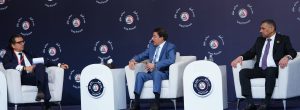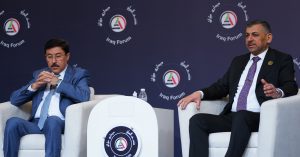- Ali Allaq, Governor of Iraq’s Central Bank
- Haider Hanoon, Chairman of Integrity Committee, Iraq
- Shwan Ibrahim Taha, Chairman of Rabee Security (Moderator)
It is no secret that Iraq’s financial system does not meet the challenges or aspirations of Iraqis. Last year’s ‘Heist of the Century’ and the latest volatility in the value of the Iraqi Dinar exposed the structural and functional weaknesses within Iraq’s financial system that has allowed staggering revenues to be syphoned from state coffers. In all its forms, corruption has become deep rooted and institutionalised in Iraq, presenting a significant barrier to progress.
The new government has pledged to make tackling corruption and reforming the financial system among its top priorities, and the challenges to achieving this are vast. Despite its great natural and human resources, Iraq has remained a rentier state, dependent on oil exports as the primary source of revenue. Other sectors such as the manufacturing, agriculture and tourism industries, among others, remain in their infancy, and youth unemployment is high.
In this panel, two figures – the Governor of Iraq’s Central Bank (CBI), Ali Allaq, and Haider Hanoon, the Chairman of Integrity Committee – took a look back at the past six months in Iraq, following the inauguration of the new government, assessing its progress and providing both an overview of the challenges facing the country’s economy, and sharing their vision for reforming the financial system, including the banking sector, to better serve Iraqis.

Opening the conversation, Ali Allaq stressed the importance of stability in the financial market. “The Central Bank of Iraq sees the exchange rate as a priority,” he told the audience, illustrating recent efforts taken at the bank to stabilise the exchange rate. Haider Hanoon, Chairman of Iraq’s Integrity Committee, was more vocal on the issue of corruption, telling the audience that the rapid increase in corruption since the collapse of the dictatorship has become an issue of “silence”, one in which everyone knows how widespread it is, but doesn’t talk about it. “We all know how widespread it is,” he said, “Corruption is a crime like all other crimes. The criminals should be brought to justice. This crime has become a phenomenon, become a lifestyle, a policy. People compete to steal the people’s money, and to steal hope.”
“Corruption found leaders, soldiers, and beneficiaries… [but] the Integrity Commission has found no soldiers or fighters to support it,” he continued. “Corruption accumulated, and has become like a commodity… a culture. Those who want to live on corruption and benefit from corruption must redeem themselves and listen to their conscience and fear God because Iraq is a sacred country.” According to Hanoon, “Corruption has become a phenomenon because people did not talk about it or address it”.
“It is the people’s will to fight corruption,” Hanoon said, implying that responsibility lies with the people of Iraq. “We will soon put a strategy forward to fight corruption? Corruption is a crime, which will never end, like other crimes. We have to set rules, deterrent rules, and so on.” Nevertheless, he acknowledged that informing the authorities are another important method of whistleblowing about acts of corruption. So too is digitisation, which is something he is pushing to see implemented, and believes will be better able to monitor abuses of corruption.
Regarding the committee’s work with the courts to prosecute corruption through the legal system, Hanoon was hopeful. “We are sure we will get good results… Corruption is a big crime in this country, but it must decrease. I will take a pledge to achieve such a thing. Fighting corruption depends on God, determination, and loving Iraq.”

Pushed by the moderator for concrete steps at the CBI, who suggested that 20 years ago Iraq’s 73 banks should have been closed or privatised, Allaq told the audience that he cannot provide a detailed description of this in such a rapidly changing environment. “We are facing inherited, accumulated reasons,” he said, acknowledging the fast-moving pressure, and the slow pace of change. “These banks are state-owned banks, and the linkage is exceptional and strange… There are major obstacles, and we are doing our best to remove these obstacles. We cannot produce accounts from previous years – this is a serious issue we are suffering from.” Asked for a figure on the reserves of the CBI’s assets and the cost of maintaining the federal rate, Allaq could not directly answer. “It depends on the calculation of the assets,” he said. Regarding the recovery of foreign currency, he told the audience that: “We work jointly in the framework… we have set up channels to monitor this.”
Concluding the conversation, Hanoon said that a combination of laws, institutions, and people’s will are needed to fight corruption. “Poor people are the victims of corruption, and they sacrificed their blood to fight corruption,” he said. “Wherever we find it, we have to fight corruption… [Prime Minister] Al-Sudani has a true drive to fight corruption,” he added. “We have to provide services to the people and it is a government failure that we are not doing this. We have to remove the inefficient officials. Why should we keep inactive, lazy people in high positions? We need to remove them and bring in new skilled people. We have to have faith in God, and believe we will be held accountable… We left Iraq to be taken by the corrupt, we have to reconcile and grasp this opportunity to save Iraq.” Questioned on the necessary specific legislative reforms, Hanoon said that the Integrity Committee was currently in the stage of studying the legislation, and following up on cases to study results, and assess what works. “We have to narrow the gap, and not give any space for them to commit their crimes.”
Iraq Forum: For Stability and Prosperity
3/05/2023
Session 1: Tackling Corruption and Reforming the Financial System
Session video

